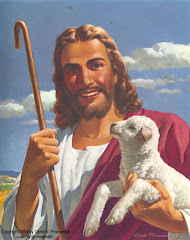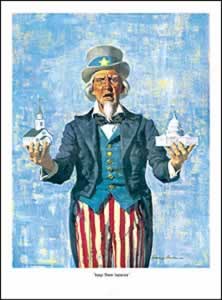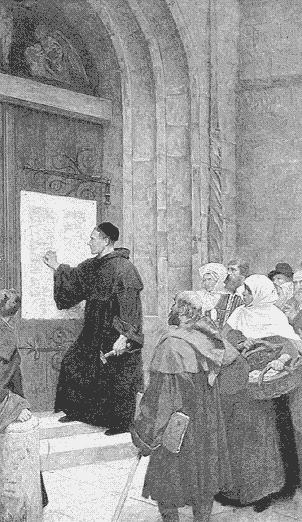Wednesday, February 17, 2010
"When ye see these things come to pass, know ye that the kingdom of God is nigh at hand"
Even the increased technological advancements of seismographs and their placements does not account for the 750% increase in earthquakes of 6.0 magnitude or greater over the past 15 years compared to the century and a half prior to that.
An independent study based on information available through the U. S. Geological Survey noted that from the mid 1850s until the late 1900s there was an average of about 20 strong quakes of 6.0 magnitude or greater per year.
However, from 1990 through 2004 the yearly average jumped from 20 to 150 earthquakes of a 6.0 magnitude or greater per year. That averages out to about one every two and a half days. Source
"Science seeks to explain all these. The signs thickening around us, telling of the near approach of the Son of God, are attributed to any other than the true cause. Men cannot discern the sentinel angels restraining the four winds that they shall not blow until the servants of God are sealed; but when God shall bid His angels loose the winds, there shall be such a scene of strife as no pen can picture." Testimonies, vol. 6, p. 408.
And when these things begin to come to pass, then look up, and lift up your heads; for your redemption draweth nigh. And he spake to them a parable; "Behold the fig tree, and all the trees; When they now shoot forth, ye see and know of your own selves that summer is now nigh at hand. So likewise ye, when ye see these things come to pass, know ye that the kingdom of God is nigh at hand." Luke 21:25-33
"Verily I say unto you, This generation shall not pass away, till all be fulfilled. Heaven and earth shall pass away: but my words shall not pass away." Luke 21:32
Friday, February 12, 2010
Thomas Jefferson's Prophecy
The Founding Fathers had a deep concern as to where this nation would be headed after the war that won its independence. Even though the ending of the Revolutionary War promised the dawning of a new day, which would bring to an end civil punishment for religious non-conformity, Thomas Jefferson expressed deep concerns. In a most unusual prophetic utterance following the Revolutionary War, the author of the Declaration of Independence, who later served as the third president of the United States, wrote:
“Besides, the spirit of the times may alter, will alter. Our rulers will become corrupt, our people careless. A single zealot may commence persecution, and better men be his victims. It can never be too often repeated, that the time for fixing every essential right on a legal basis is while our rulers are honest, and ourselves united. From the conclusion of this war we shall be going downhill. It will not then be necessary to resort every moment to the people for support. They will be forgotten therefore, and their rights disregarded. They will forget themselves, but in the sole faculty of making money, and will never think of uniting to effect a due respect for their rights. The shackles, therefore, which shall not be knocked off at the conclusion of this war, will remain on us long, will be made heavier and heavier, till our rights shall revive or expire in a convulsion.”*
*Adrienne Koch and William Peden, The Life and Selected Writings of Thomas Jefferson, Notes on Virginia, Query XVII (New York NY: Random House, Inc.) 1944. P. 277.
“Besides, the spirit of the times may alter, will alter. Our rulers will become corrupt, our people careless. A single zealot may commence persecution, and better men be his victims. It can never be too often repeated, that the time for fixing every essential right on a legal basis is while our rulers are honest, and ourselves united. From the conclusion of this war we shall be going downhill. It will not then be necessary to resort every moment to the people for support. They will be forgotten therefore, and their rights disregarded. They will forget themselves, but in the sole faculty of making money, and will never think of uniting to effect a due respect for their rights. The shackles, therefore, which shall not be knocked off at the conclusion of this war, will remain on us long, will be made heavier and heavier, till our rights shall revive or expire in a convulsion.”*
*Adrienne Koch and William Peden, The Life and Selected Writings of Thomas Jefferson, Notes on Virginia, Query XVII (New York NY: Random House, Inc.) 1944. P. 277.
Thursday, February 11, 2010
The Papacy does not Believe in Religious Freedom
"Religious liberty, in the sense of liberty possessed by every man to choose his religion, is one of the most wicked delusions ever foisted upon this age by the father of all deceit. The very name of liberty - except in the sense permission to do certain definite acts - ought to be banished from the domain or religion. It is neither more or less than falsehood. No man has a right to choose his religion [how can you then convert to Catholicism!]… Shall I hold out hopes to my erring protestant brother that I will not meddle with his creed if he will not meddle with mine?… No: Catholicism is the most intolerant of creeds. It is intolerance itself." (From "The Rambler", a Catholic publication from London, England, quoted in Romanism vs. Catholicism, p. 106, by T. W. Callaway.)
In the Catholic paper "Shepherd of the Valley", published at St. Louis, Mo., USA, in 1876, under the supervision of Archbishop Kendrick, we read: "We confess that the Roman Catholic Church is intolerant; that is to say, that it uses all the means in its power for the extirpation of error and sin; but this intolerance is the logical and necessary consequence of her infallibility. She alone has the right to be intolerant, because she alone has the truth [God has all the truth. Is He intolerant?]. The Church tolerates heretics where she is obliged to do so, but she hates them mortally, and employs all her forces to secure their annihilation. When the Catholics shall be in possession of a considerable majority - which will certainly be the case by and by - then religious liberty will have come to an end in the United States. Our enemies say this, and we believe them. Our enemies know that do pretend to be better than our church, and in what concerns her history is open to all. They know, then, how the Roman Church dealt with heretics in the Middle Ages, and how she deals with them today where she has the power. We think no more of denying these historic facts than we do of blaming the saints of God and the princes of the Church for what they have done and approved in these matters." The Catholic bishop O'Connor says: "Religious liberty is merely endured until the opposite can be carried into effect without peril to the Catholic Church." (T. W. Callaway: Americanism vs. Romanism, p. 118.)
see this source
In the Catholic paper "Shepherd of the Valley", published at St. Louis, Mo., USA, in 1876, under the supervision of Archbishop Kendrick, we read: "We confess that the Roman Catholic Church is intolerant; that is to say, that it uses all the means in its power for the extirpation of error and sin; but this intolerance is the logical and necessary consequence of her infallibility. She alone has the right to be intolerant, because she alone has the truth [God has all the truth. Is He intolerant?]. The Church tolerates heretics where she is obliged to do so, but she hates them mortally, and employs all her forces to secure their annihilation. When the Catholics shall be in possession of a considerable majority - which will certainly be the case by and by - then religious liberty will have come to an end in the United States. Our enemies say this, and we believe them. Our enemies know that do pretend to be better than our church, and in what concerns her history is open to all. They know, then, how the Roman Church dealt with heretics in the Middle Ages, and how she deals with them today where she has the power. We think no more of denying these historic facts than we do of blaming the saints of God and the princes of the Church for what they have done and approved in these matters." The Catholic bishop O'Connor says: "Religious liberty is merely endured until the opposite can be carried into effect without peril to the Catholic Church." (T. W. Callaway: Americanism vs. Romanism, p. 118.)
see this source
Saturday, February 6, 2010
The Order of Events that will lead to the National Sunday law in the United States
"The sins of Babylon will be laid open. The fearful results of a union of Church and State, the inroads of Spiritualism, the stealthy but rapid progress of the papal power,--all will be nmasked. By these solemn warnings the people will be stirred. Thousands upon thousands have never listened to words like these.In amazement they hear the testimony that Babylon is the church, fallen because of her errors and sins, because of her rejection of the truth sent to her from Heaven. The people go to their former teachers with the eager inquiry, Are these things so? The ministers present fables, prophesy smooth things, to soothe their fears, and quiet the awakened conscience. But many refuse to be satisfied with the mere authority of men, and demand a plain 'Thus saith the Lord.'The popular ministry, like the Pharisees of old, are filled with anger as their authority is questioned; they denounce the message as of Satan, and stir up the sin-loving multitudes to revile and persecute those who proclaim it. "As the controversy extends into new fields, and the minds of the people are called to God's down-trodden law, Satan is astir. The power attending the message only maddens those who oppose it. The clergy put forth almost superhuman efforts to shut away the light, lest it should shine upon their flocks. By every means at their command they endeavor to suppress the discussion of these vital questions. The church appeals to the strong arm of civil power, and in this work, papists are solicited to come to the help of Protestants. The movement for Sunday enforcement becomes more bold and decided. The law is invoked against commandment-keepers." - Spirit of Prophecy, vol 4, p 424-425
Friday, February 5, 2010
At the United Nations, pope Bennedict Identifies the "Problem" and "the only way to combat it"
The RCC “makes its contribution (in the ethical and moral sphere) according to the dispositions of international law, helps to define that law, and makes appeal to it”, that we live in a time when little groups of independent people threaten the unity of the world, and that the only way to combat this problem is by establishing law and then ordering all of society according to this law, thus promoting “peace and good will throughout the earth.” - Apostolic Journey to the United States of America and Visit to the United Nations Organization Headquarters, Meeting with the Members of the General Assembly of the United Nations Organization, Address of Pope Benedict XVI, New York, Friday, April 18, 2008.
Compare the stated intentions of the papacy with this prophetic statement:
The persistent refusal of a small minority to yield to the popular demand, will make them objects of universal execration. It will be urged that the few who stand in opposition to an institution of the church and a law of the State, ought not to be tolerated; that it is better for them to suffer than for whole nations to be thrown into confusion and lawlessness. The same argument eighteen hundred years ago was brought against Christ by the "rulers of the people." "It is expedient for us," said the wily Caiaphas, "that one man should die for the people, and that the whole nation perish not." [JOHN 11:50.] This argument will appear conclusive; and a decree will finally be issued against those who hallow the Sabbath of the fourth commandment, denouncing them as deserving of the severest punishment, and giving the people liberty, after a certain time, to put them to death. Romanism in the Old World, and apostate Protestantism in the New, will pursue a similar course toward those who honor all the divine precepts. -The Great Controversy, p. 616 (1888)
Compare the stated intentions of the papacy with this prophetic statement:
The persistent refusal of a small minority to yield to the popular demand, will make them objects of universal execration. It will be urged that the few who stand in opposition to an institution of the church and a law of the State, ought not to be tolerated; that it is better for them to suffer than for whole nations to be thrown into confusion and lawlessness. The same argument eighteen hundred years ago was brought against Christ by the "rulers of the people." "It is expedient for us," said the wily Caiaphas, "that one man should die for the people, and that the whole nation perish not." [JOHN 11:50.] This argument will appear conclusive; and a decree will finally be issued against those who hallow the Sabbath of the fourth commandment, denouncing them as deserving of the severest punishment, and giving the people liberty, after a certain time, to put them to death. Romanism in the Old World, and apostate Protestantism in the New, will pursue a similar course toward those who honor all the divine precepts. -The Great Controversy, p. 616 (1888)



































